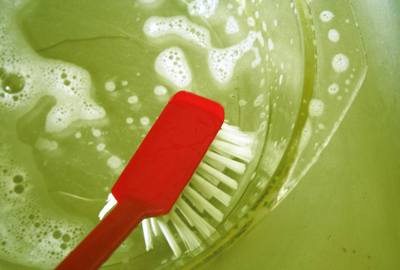 By TreeLiving
By TreeLiving
The kitchen is an area of the home where a lot of water tends to be used. From dish washing to vegetable rinsing, water use in the kitchen is significant. Here are some tips on how you can save water in the kitchen.
1. Install low-flow faucets in your kitchen sinks
You don't need to replace your entire faucet. Just purchase wate r-conserving aerators to install on your existing faucets. These aerators mix air with the water, making it come out with more force and over a larger area. This is also a good feature for rinsing vegetables.
2. Use a bowl or sink filled with water
When you are washing fruits and vegetables, use a bowl filled with water to rinse them, or fill your sink with water and place the produce into the water. The grit and dirt will sink to the bottom of the bowl or sink.
3. Use the water from the bowl or sink
When you are finished washing your produce, don't pour the water down the sink. Use it to water your plants, garden, or yard.
4. Scrub pots and pans with the water turned off
If you hand wash your dishes or have to pre-rinse your dishes before running them in the dishwasher, don't hold them under running water while you scrub. For washing dishes by hand, fill one side of your sink with hot, soapy water and the other side with rinse water (or use a rubber dish tub if you have a single sink).
While you are washing, heat a modest amount of water on the stove until it boils. When the dishes are washed and rinsed, set the dish rack into the empty sink and pour the boiling water over the dishes. This sterilizes them and dries them quickly.
If you need to rinse and scrub your dishes before running them through the dishwasher, fill a sink or dish tub with water. Set your well-scraped and dirty dishes into the water reservoir, and when it's time to load the dishwasher, remove the dishes from the water, scrub, and place in the dishwasher.
5. Use rain water in the kitchen
If you have a rain barrel, you can use rain water in the kitchen for some applications. You can't drink it, but you can use it to wash your hands or rinse your dishes before placing them in the dishwasher. Re-use plastic milk jugs, buckets, or other containers to keep some rain water handy in the kitchen.
6. Run the dishwasher only when it's full
This reduces the total number of times you use your dishwasher, and ensures that you are not using excessive water to wash just a few dishes.

